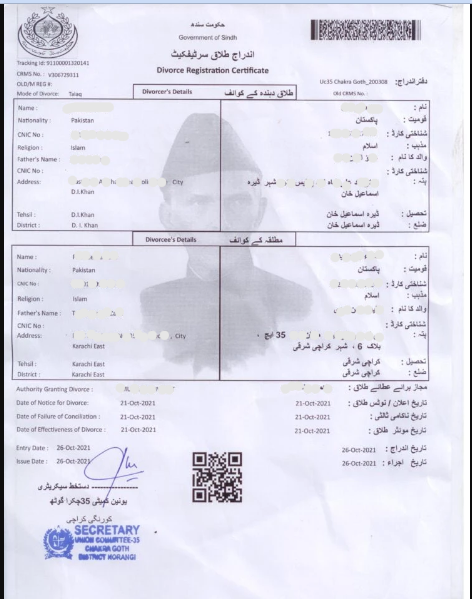Talaq-e-Bain in Pakistan: An In-depth Analysis
Introduction
Talaq-e-Bain, one of the forms of divorce under Islamic law, holds significant legal, social, and religious implications in Pakistan. This form of divorce is irrevocable, marking a permanent end to the marriage without the possibility of reconciliation without a fresh contract of marriage. Understanding Talaq-e-Bain within the context of Pakistan’s legal and societal framework requires exploring its religious foundations, legal regulations, and the socio-cultural dimensions that influence its practice and perception.
Religious Foundations of Talaq-e-Bain
In Islamic jurisprudence, divorce (talaq) is categorized into several types, each with specific conditions and implications. Talaq-e-Bain (irrevocable divorce) is distinct because, once pronounced, the couple cannot reunite without a new marriage contract and the woman completing a new waiting period (iddah). This form of divorce is mentioned in various Islamic texts, including the Quran and Hadith, which emphasize the sanctity of marriage but also provide a framework for its dissolution in cases of necessity.
Quranic Perspective
The Quran, the primary source of Islamic law, addresses the concept of divorce in several verses. Surah Al-Baqarah (2:229) states:
“Divorce is twice. Then, either keep [her] in an acceptable manner or release [her] with good treatment.”
This verse indicates that after two pronouncements of divorce, the husband must decide to either reconcile with his wife or separate amicably. However, after a third pronouncement (Talaq-e-Bain), reconciliation is not permitted without a new marriage contract, as stated in Surah Al-Baqarah (2:230):
“And if he has divorced her [for the third time], then she is not lawful to him afterward until [after] she marries a husband other than him.”
Hadith Literature
The Hadith literature, comprising the sayings and actions of Prophet Muhammad (PBUH), further elaborates on the conditions and procedures for divorce. The Prophet emphasized that divorce, although permissible, is the most disliked permissible act in the sight of Allah. He advocated for reconciliation and patience but recognized the necessity of divorce in irreconcilable situations.
Legal Framework in Pakistan
Pakistan, being an Islamic republic, derives its personal law concerning marriage and divorce from Islamic principles. The legal framework governing Talaq-e-Bain in Pakistan is a blend of Sharia law and statutory regulations, primarily outlined in the Muslim Family Laws Ordinance (MFLO) of 1961.
Muslim Family Laws Ordinance, 1961
The MFLO, enacted to regulate marriage and divorce among Muslims in Pakistan, includes provisions specifically addressing Talaq-e-Bain. According to Section 7 of the MFLO, a husband who wishes to divorce his wife must pronounce talaq and then notify the Chairman of the Union Council in writing. This notice initiates a process of reconciliation facilitated by the Union Council. If reconciliation fails, the divorce becomes effective after the expiration of 90 days from the date of the notice.
The MFLO aims to ensure that divorce is not pronounced in haste and provides a mechanism for mediation, reflecting the Quranic principle of seeking reconciliation before finalizing a divorce.
Social and Cultural Dimensions
The practice and perception of Talaq-e-Bain in Pakistan are influenced by various social and cultural factors, including gender dynamics, societal norms, and economic conditions. These factors often impact the experiences of individuals undergoing divorce and shape the broader discourse on marital dissolution.
Gender Dynamics
In Pakistani society, gender dynamics play a crucial role in the process of Talaq-e-Bain. Traditionally, men hold the authority to pronounce talaq, although women can seek divorce through judicial khula. This gender disparity often leads to unequal power dynamics within marriages, where men may exercise their right to divorce without considering the implications for their wives and children.
Efforts to address these disparities include advocating for women’s rights, legal reforms, and raising awareness about the importance of mutual respect and consultation in marital relationships.
Societal Norms and Stigma
Divorce, including Talaq-e-Bain, carries significant social stigma in Pakistan. Divorced women often face societal judgment and ostracism, affecting their social standing and opportunities for remarriage. This stigma can deter women from seeking divorce, even in abusive or irreconcilable marriages, highlighting the need for societal change to support individuals’ right to make personal decisions without fear of social repercussions.
Economic Conditions
Economic factors also influence the practice of Talaq-e-Bain. Financial dependency on husbands can make it difficult for women to seek divorce, especially if they lack education or employment opportunities. Addressing these economic challenges requires comprehensive strategies, including promoting women’s education, employment, and access to legal and financial support systems.
Case Studies and Real-life Implications
To illustrate the complexities and real-life implications of Talaq-e-Bain in Pakistan, it is essential to examine case studies and testimonies from individuals who have experienced this form of divorce. These narratives provide valuable insights into the challenges and opportunities faced by those navigating the legal and social landscape of marital dissolution.
Case Study 1: Ayesha’s Story
Ayesha, a 35-year-old woman from Lahore, experienced Talaq-e-Bain after 10 years of marriage. Her husband pronounced talaq thrice in a fit of anger, resulting in an irrevocable divorce. Ayesha faced significant challenges, including societal judgment and economic instability, as she struggled to support herself and her children. Her story underscores the need for legal reforms and social support systems to protect the rights and dignity of divorced women.
Case Study 2: Ahmed’s Story
Ahmed, a 40-year-old man from Karachi, also experienced the complexities of Talaq-e-Bain. After pronouncing talaq thrice, he regretted his decision and sought reconciliation with his wife. However, the irrevocable nature of Talaq-e-Bain prevented their reunion without a new marriage contract. Ahmed’s experience highlights the importance of considering the long-term implications of divorce and seeking mediation before making irreversible decisions.
Legal Reforms and Advocacy
Addressing the challenges associated with Talaq-e-Bain in Pakistan requires comprehensive legal reforms and advocacy efforts. These reforms should focus on protecting individuals’ rights, promoting gender equality, and ensuring that divorce procedures align with Islamic principles and contemporary societal needs.
Strengthening Legal Protections
Legal protections for individuals undergoing Talaq-e-Bain should be strengthened to prevent misuse and ensure fair treatment. This includes enforcing the requirement for written notice and mediation, providing legal aid to those unable to afford representation, and imposing penalties for violations of legal procedures.
Promoting Gender Equality
Promoting gender equality is crucial in addressing the power imbalances in marital relationships. Legal reforms should include provisions for women’s rights to seek divorce on equal grounds, access to financial support, and protection against domestic violence. Additionally, raising awareness about women’s rights and empowering women through education and employment opportunities can contribute to more equitable marital dynamics.
Public Awareness and Education
Raising public awareness and education about the legal and religious aspects of Talaq-e-Bain is essential in promoting informed decision-making and reducing social stigma. Public campaigns, workshops, and educational programs can help individuals understand their rights and responsibilities, fostering a more supportive and respectful societal environment for those undergoing divorce.
Legal Proceedings of Talaq-e-Bain in Pakistan
Talaq-e-Bain, being an irrevocable form of divorce, entails specific legal proceedings and procedures under Pakistani law. These proceedings aim to ensure that the process of divorce is carried out with due consideration, fairness, and adherence to Islamic principles. The legal framework primarily involves the Muslim Family Laws Ordinance (MFLO) of 1961, which regulates the pronouncement and effectuation of talaq in Pakistan.
Steps in the Legal Proceedings of Talaq-e-Bain
- Pronouncement of Talaq:
-
- The husband pronounces talaq, which can be done either orally or in writing. According to Islamic law, the pronouncement should be clear and unambiguous.
- Written Notice to the Union Council:
-
- After the pronouncement of talaq, the husband is required to provide a written notice to the Chairman of the Union Council. This notice must include the date and details of the pronouncement.
- Section 7 of the MFLO mandates this step to ensure that the divorce process is formally initiated and documented.
Sample of Written Notice of Talaq to the Union Council
[Your Name]
[Your Address]
[City, Postal Code]
[Date]
Chairman
Union Council [Name]
[Union Council Address]
[City, Postal Code]
Subject: Notice of Talaq
Dear Sir,
I, [Your Name], son of [Father’s Name], resident of [Your Address], do hereby solemnly declare that I have pronounced talaq (divorce) to my wife, [Wife’s Name], daughter of [Wife’s Father’s Name], resident of [Wife’s Address], on [Date of Pronouncement].
This notice is being given to you in accordance with the provisions of the Muslim Family Laws Ordinance, 1961, and the rules framed thereunder. I understand that this notice will initiate the mandatory period of reconciliation and arbitration as stipulated by the law.
The details of the talaq are as follows:
- Date of Marriage: [Date of Marriage]
- Date of Talaq Pronouncement: [Date of Pronouncement]
- Effective Date of Talaq: [Effective Date, if different from pronouncement date]
- Reason for Talaq: [Reason for Talaq, if you wish to state]
Please acknowledge the receipt of this notice and initiate the process as required under the law. Kindly notify my wife, [Wife’s Name], about this notice and proceed with the necessary formalities.
Thank you for your cooperation.
Yours sincerely,
[Your Signature]
[Your Name]
[Your CNIC Number]
Attachments:
- Copy of CNIC
- Copy of Nikahnama (Marriage Certificate)
- Any other relevant documents
Ensure that you send this notice through registered mail or submit it personally at the Union Council office and get an acknowledgment receipt. It is advisable to keep copies of all documents and correspondences for your records.
- Copy to the Wife:
- A copy of the written notice sent to the Union Council must also be delivered to the wife. This ensures that she is formally informed of the talaq and can prepare for any subsequent proceedings.
- Constitution of Arbitration Council:
- Upon receiving the notice, the Chairman of the Union Council constitutes an Arbitration Council. The council consists of representatives from both the husband’s and the wife’s families.
- The primary purpose of the Arbitration Council is to attempt reconciliation between the husband and wife. This step reflects the Islamic principle of seeking reconciliation before finalizing the divorce.
- Reconciliation Efforts:
- The Arbitration Council engages in reconciliation efforts, providing a platform for dialogue and mediation between the parties.
- The council is given a period of 90 days from the date of the written notice to attempt reconciliation.
- Completion of
IddahPeriod:- The wife must observe a waiting period (
iddah) following the pronouncement of talaq. For Talaq-e-Bain, theiddahperiod is typically three menstrual cycles or three lunar months, unless the wife is pregnant, in which case the period extends until the birth of the child. - During the
iddahperiod, the wife remains in the husband’s home, and both parties are encouraged to reconsider their decision.
- The wife must observe a waiting period (
- Effectuation of Divorce:
- If the reconciliation efforts by the Arbitration Council fail and the
iddahperiod is completed without any reconciliation, the divorce becomes effective. - The Union Council then issues a certificate of divorce, formally recognizing the dissolution of the marriage.
- If the reconciliation efforts by the Arbitration Council fail and the
- Registration of Divorce:
- The final step is the registration of the divorce with the relevant authorities. This ensures that the divorce is legally recognized and recorded in official records.

Legal Considerations and Challenges
- Compliance with MFLO:
- Strict compliance with the provisions of the MFLO is crucial for the validity of the divorce. Any deviation from the prescribed procedures can render the divorce legally invalid.
- For example, failure to provide written notice to the Union Council or the wife can result in legal challenges and disputes.
- Rights of the Wife:
- The legal proceedings aim to protect the rights of the wife, ensuring that she is informed and given an opportunity for reconciliation.
- The wife has the right to challenge the validity of the talaq if procedural requirements are not met.
- Role of Arbitration Council:
- The effectiveness of the Arbitration Council in facilitating reconciliation is a critical aspect of the legal proceedings. The council’s efforts and recommendations play a significant role in the final outcome of the divorce process.
- The impartiality and fairness of the Arbitration Council are essential to ensure that both parties are heard and treated equitably.
- Legal Representation:
- Both parties have the right to legal representation during the proceedings. Legal counsel can assist in ensuring that their rights are protected and that the proceedings are conducted fairly.
- Social and Cultural Influences:
- Social and cultural factors can impact the legal proceedings of Talaq-e-Bain. Societal stigma, gender dynamics, and economic conditions can influence the willingness of parties to engage in reconciliation or pursue legal challenges.
- Addressing these influences requires a holistic approach, including public awareness, education, and support systems for individuals undergoing divorce.
Conclusion
The legal proceedings of Talaq-e-Bain in Pakistan are designed to ensure that the process of divorce is carried out with due consideration, fairness, and adherence to Islamic principles. The steps involved, from the pronouncement of talaq to the issuance of a divorce certificate, aim to protect the rights of both parties and provide opportunities for reconciliation. However, challenges such as compliance with legal requirements, social stigma, and gender dynamics must be addressed to ensure a just and equitable process. Through legal reforms, advocacy, and public awareness, Pakistan can enhance the effectiveness and fairness of the legal proceedings for Talaq-e-Bain, reflecting the true spirit of Islamic teachings on marriage and divorce.


